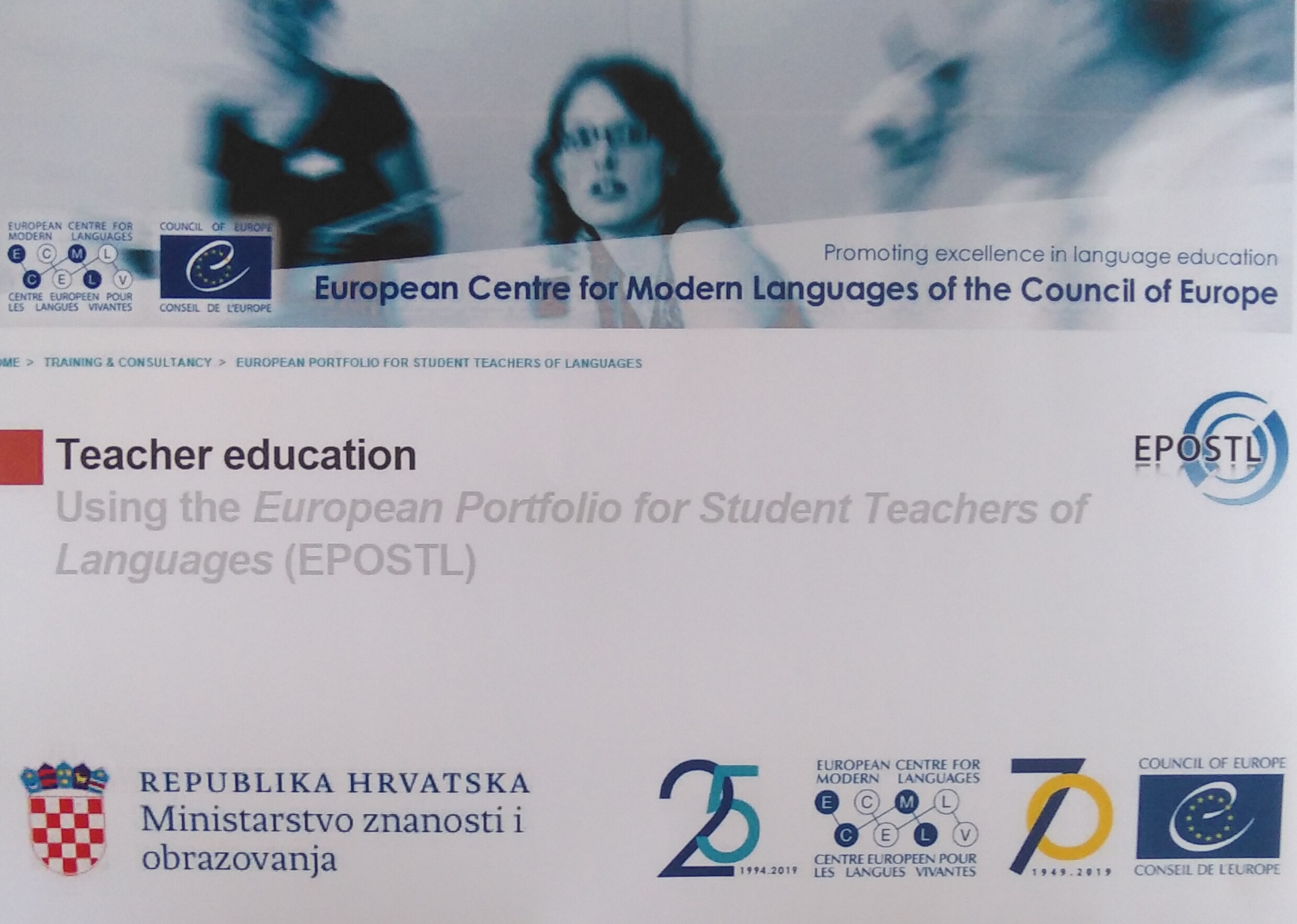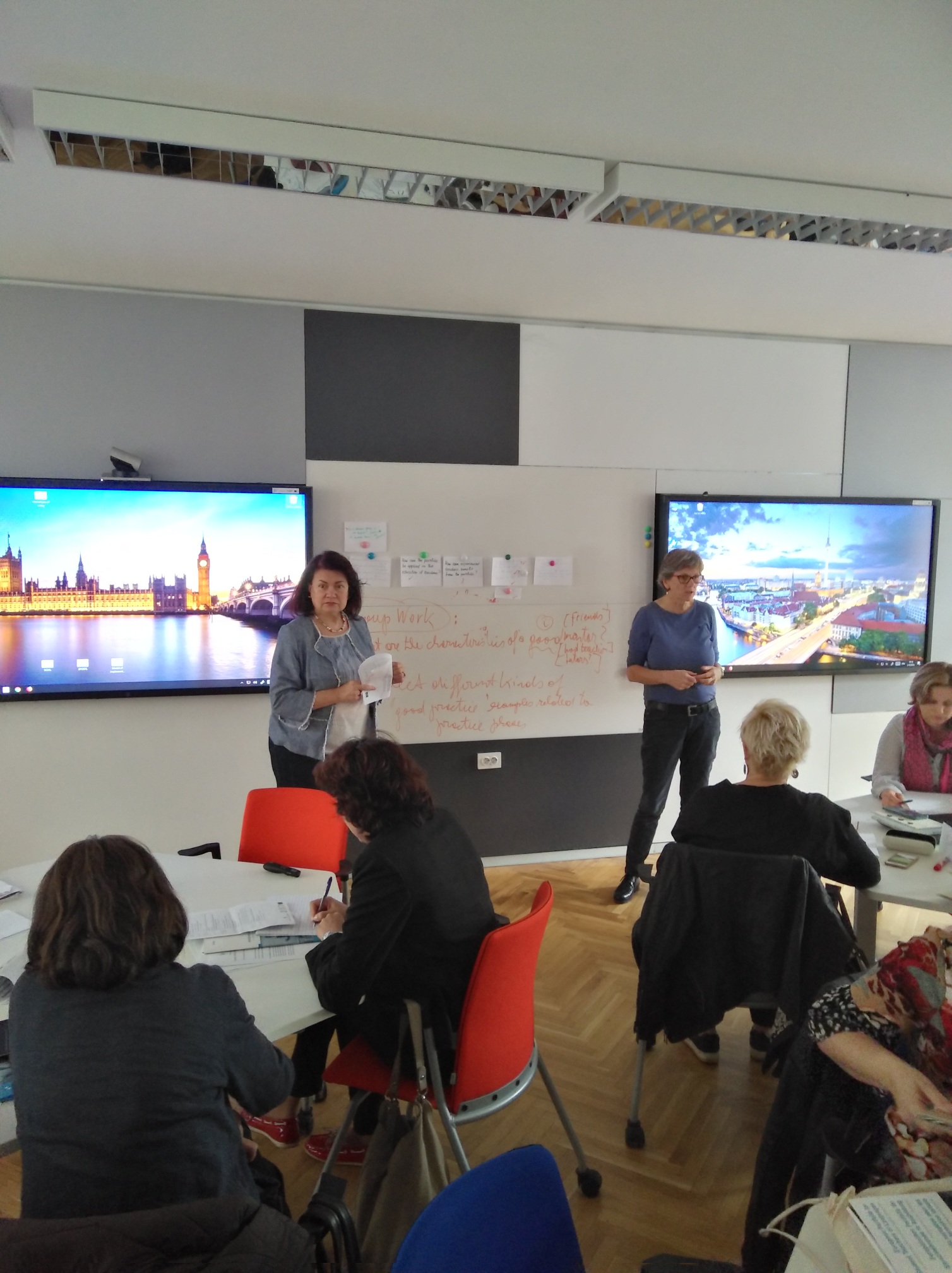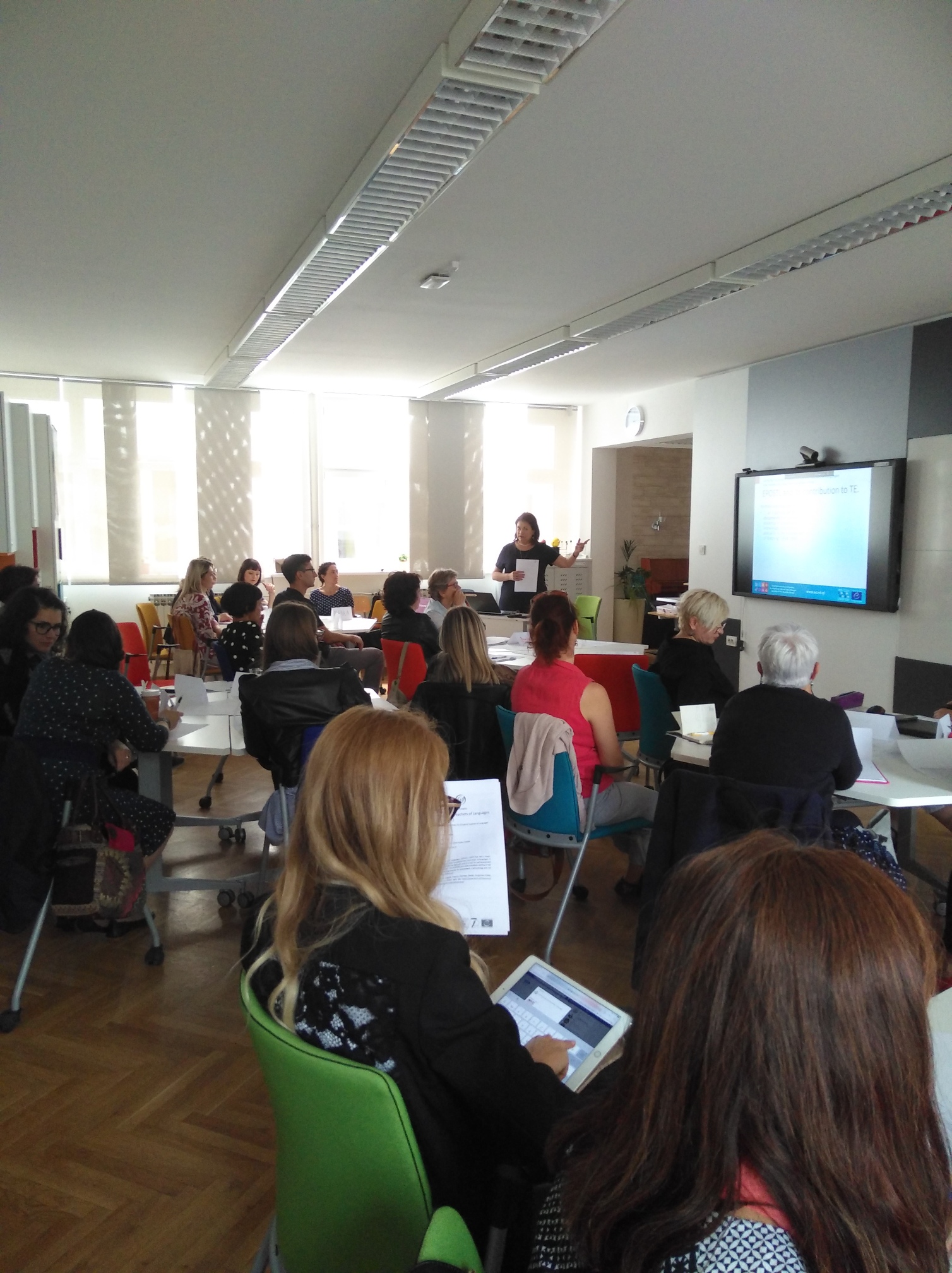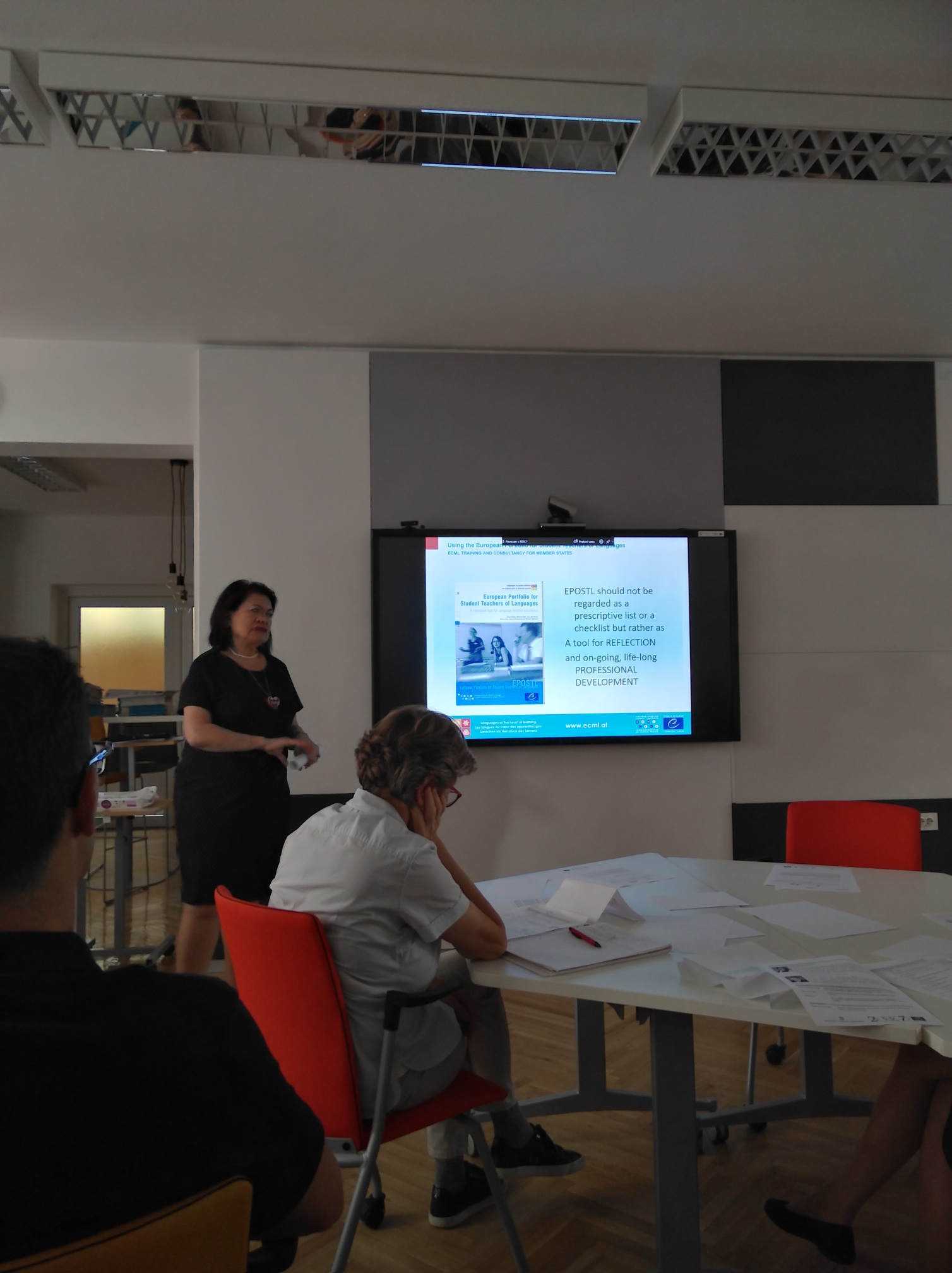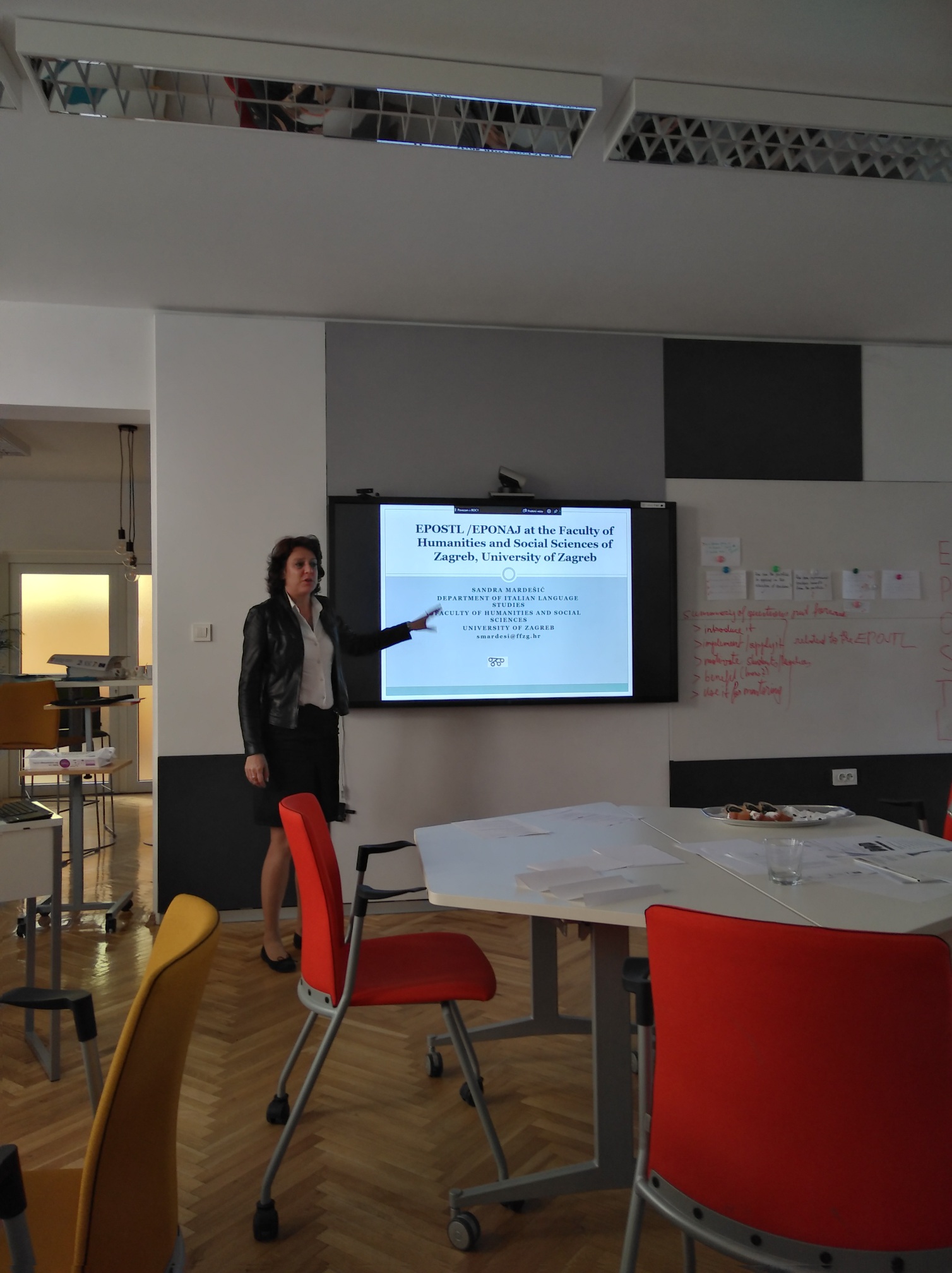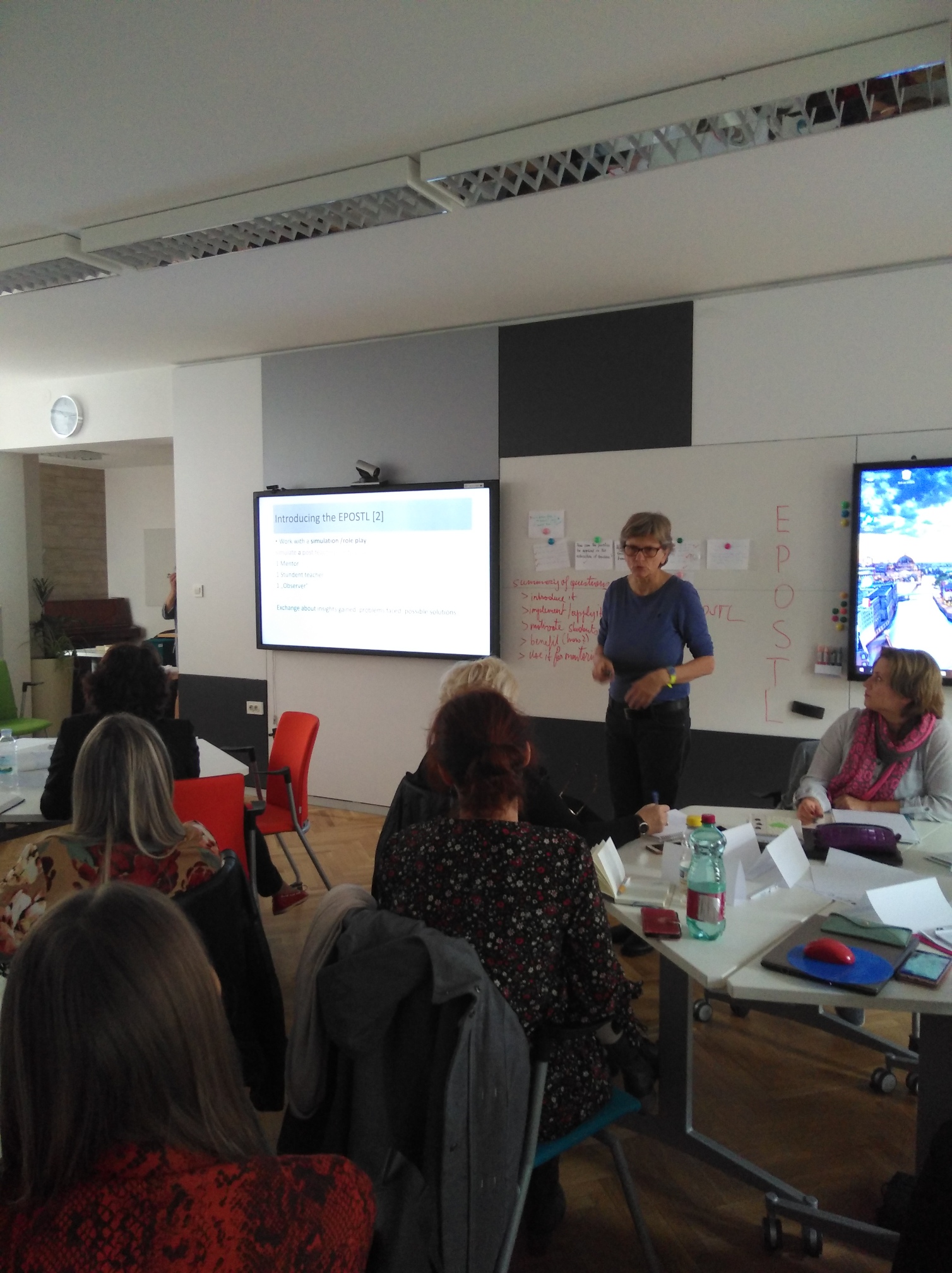News
27.01.2026
The CEFR Companion Volume: Mediation and other key concepts
Date the event: 26-27 November 2025
Venue: Zagreb, Croatia
Local organisers: Danijela Ille, senior advisor for EFL, and Izabela Potnar Mijić, senior advisor for English and German as foreign languages, Croatia
ECML experts: Barbara Sawicka (Poland) and Magdalini Liontou (Finland)
Participants: 29 senior advisors for English and German as foreign languages, regional leaders (secondary schools), teachers in secondary schools where mediation is an element of assessment
Teaching mediation is an important part of the foreign language curriculum in the Republic of Croatia. Languages which are taught as the first foreign language in grammar schools (and some vocational schools) have language mediation as an element of assessment. Therefore, it is important for teachers to feel confident in teaching mediation. They should also be able to select and apply a range of activities, methods, and forms of work in order to ensure that assessment results are as valid and meaningful as possible. The Training and consultancy event entitled “The CEFR Companion Volume: Mediation and other key concepts” offers a wide range of examples and incentives that teachers can immediately apply in practice. It also provides a platform for exchanging ideas and supporting teachers in teaching mediation. After this professional training, teachers gained confidence in conducting mediation activities in the classroom and learned about different applicable types of monitoring and evaluation.
Izabela Potnar Mijić, Education and teacher training agency
Croatian version
ZEROJ
Jezično posredovanje i drugi ključni koncepti
Poučavanje medijacije važan je dio kurikuluma za strane jezike u Republici Hrvatskoj. Jezici koje se poučavaju kao prvi strani jezik u gimnazijama i ponekim strukovnim školama imaju jezično posredovanje kao element ocjenjivanja. Zato je važno da nastavnici steknu sigurnost u poučavanju medijacije, mogu odabrati i primijeniti različite aktivnosti, metode i oblike rada kako bi rezultati vrednovanja bili što relevantniji. Stručno usavršavanje pod nazivom The CEFR Companion Volume: Mediation and other key concepts (ZEROJ Jezično posredovanje i drugi ključni koncepti nudi široki spektar primjera i poticaja koje nastavnici mogu odmah primijeniti u praksi, ali i platformu na kojoj se mogu izmjenjivati ideje i pružiti podrška nastavnicima u poučavanju medijacije. Nakon ovoga stručnog usavršavanja nastavnici su stekli sigurnost u provođenju aktivnosti medijacije u učionici i upoznali različite primjenjive vrste praćenja i vrednovanja.
Izabela Potnar Mijić, Education and teacher training agency
23.04.2025
National training workshop: Supporting Multilingual Classrooms (8 - 9 April 2025, Zagreb, Croatia)
Local organiser: Tomislava Maljković, Hotel and Tourism School, Zagreb
ECML experts: Chantal Muller (Belgium), Katja Schnitzer (Germany)
Participants: 23 (foreign language teachers, teachers of other subjects, teacher educators, teachers of the language of schooling, policymakers, school administrators)
On 8 and 9 April 2025, a two-day workshop on Supporting Multilingual Classrooms was held at the Hotel and Tourism School in Zagreb, Croatia. Tomislava Maljković (local coordinator) along with Ana Trogrlić and Petar Bekić liaised with the ECML expert team, Katja Schnitzer and Chantal Muller on the organisation of the event.
The Hotel and Tourism School is known for holding classes of as many as seven foreign languages as well as Croatian language classes for foreigners. It educates future tourism professionals who will, one day, work in a multicultural and multilingual environment.
This workshop enabled us, above all, to become better acquainted with the possibilities of sensitization in working with different cultures and languages, including migrant students. We also learned about the challenges and new approaches to intercultural dialogue in our classroom and beyond. It placed emphasis on the importance of first creating a microcosm of diversity respect and tolerance within ourselves, as only then can we transfer it effectively to our classroom, to our students and colleagues, and ultimately to society as a whole.
The workshop analysed how to create an inclusive environment in which all languages are valued, including the language of schooling, discussing how multilingualism in tourism and hospitality schools and other schools in Croatia can serve as an advantage and how a lifelong school approach strategy can be developed within the framework of continuous support for multilingual curricula.
One of the topics was also recognizing linguistic diversity as a pillar of learning and the holistic development of students.
Thanks to the lively input and interactive approaches of the ECML expert team, the workshop participants were introduced to new knowledge and skills that they can now apply in their classrooms.
Tomislava Maljković, local organiser, 14 April 2025
ECML project website: Supporting multilingual classrooms, ECML-EC cooperation agreement 2025 "Innovative methodologies and assessment in language learning"
02.01.2024
Unlock the future of teaching with ECML's innovative workshops
Date and venue: 16-17 October 2023, Zagreb, Croatia
Local organiser: Davor Černi, Agencija za odgoj I obrazovanje (Education and Teacher Training Agency), Zagreb
ECML moderators: Kevin Schuck (Netherlands) and Susanne Staschen-Dielmann (Germany)
Participants: 39 participants from diverse educational backgrounds, predominantly from primary and secondary schools in Croatia, primarily English language teachers
Dive into the future of education with the European Centre for Modern Languages (ECML) and its groundbreaking workshops on CLIL and Pluriliteracies Teaching for Deeper Learning (PTDL). These workshops offer a unique opportunity for educators to explore innovative teaching methodologies that integrate content and language, fostering deep learning and multilingual skills among students. Led by experienced ECML moderators, participants gain practical tools and insights to transform their teaching practices, enhancing student engagement and outcomes. Join a community of forward-thinking educators and leverage these workshops to inspire change in your classroom and beyond. Don't miss out on this chance to elevate your teaching to new heights and make a lasting impact on your students' educational journey.
Davor Černi
Croatian version
Otključajte budućnost poučavanja s inovativnim radionicama ECML-a
Zaronite u budućnost obrazovanja s Europskim centrom za moderne jezike (ECML) i njegovim revolucionarnim radionicama o CLIL-u i Poučavanju pluriliterarnosti za dublje učenje (PTDL). Ove radionice nude jedinstvenu priliku učiteljima I nastavnicima da istraže inovativne metode poučavanja koje integriraju sadržaj i jezik, potičući duboko učenje i višejezične vještine među učenicima. Pod vodstvom iskusnih moderatora ECML-a, sudionici dobivaju praktične alate i uvide za transformaciju svojih nastavnih praksi, poboljšavajući angažman i rezultate učenika. Pridružite se zajednici progresivnih učitelja I nastavnika i iskoristite ove radionice kako biste inspirirali promjene u svojoj učionici i šire. Ne propustite ovu priliku da svoje poučavanje podignete na novu razinu i ostavite trajan utjecaj na obrazovni put svojih učenika.
Davor Černi
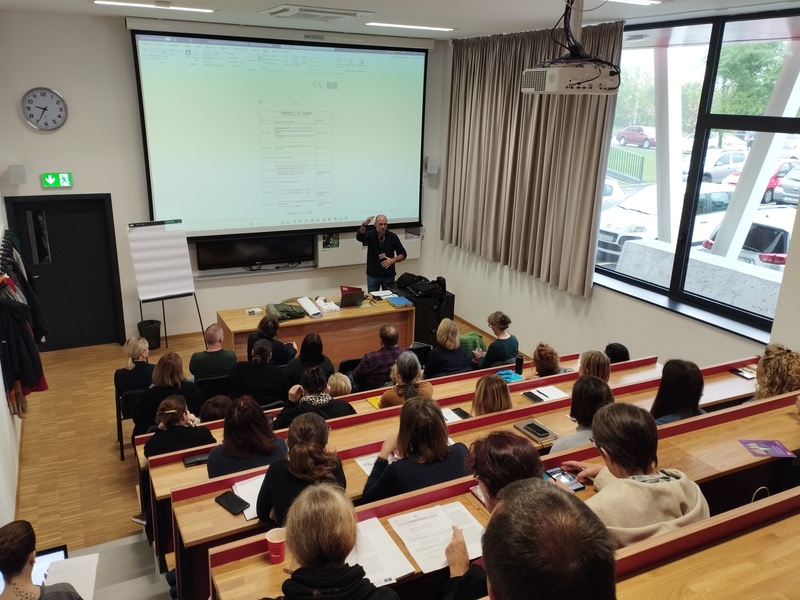
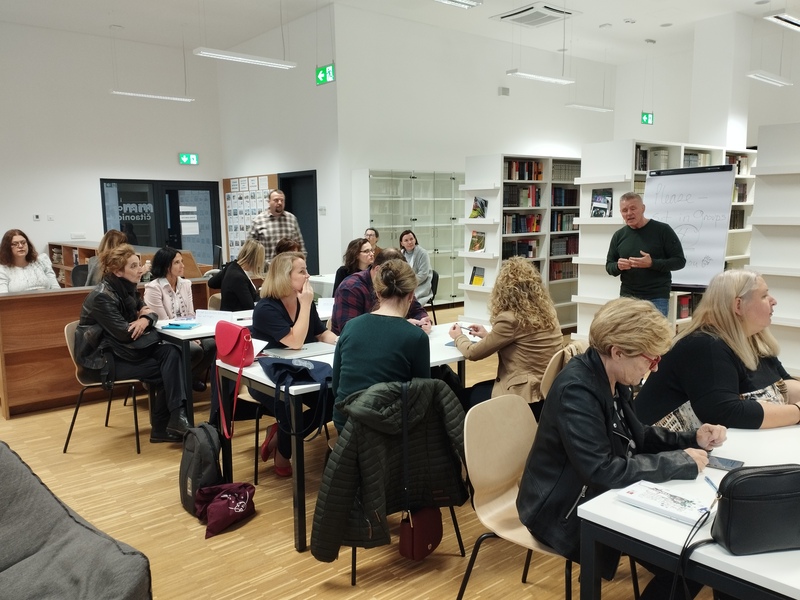
28.09.2023
National training workshop "Using ICT in support of language teaching and learning (ICT-REV)" (6 – 7 July 2023, Zagreb, Croatia)
Local organiser: Darko Matovac, Croaticum
Experts: Joe Hopkins, Spain; Sarah Heiser, United Kingdom; Ursula Stickler, United Kingdom
“The two-day workshop “Using ICT in Support of Language Teaching and Learning (ICT-REV)” was extremely useful to everyone involved, as it provided not only information on language teaching pedagogy and its relationship to ICT, but also numerous useful real-life examples of the implementation of ICT tools in teaching and learning languages. It was dynamic, useful, and fun. The workshop was tailored especially to the needs of Croatian language teachers, but all that was presented can be used by any language teacher. The workshop is an excellent place where all language teachers can participate and learn something new, regardless of how skilfully they use ICT tools to prepare teaching materials or how skilfully they use ICT tools in the language classroom. During the workshop, a language teacher can meet other language teachers and exchange ideas, try new ICT tools, hear some tips and tricks, learn about new useful ICT tools, and find other teachers willing to exchange digital teaching materials.”
Darko Matovac, local coordinator, 17 July 2023
Croatian version
Dvodnevna radionica “Using ICT in Support of Language Teaching and Learning (ICT-REV)” bila je iznimno korisna svima koji su sudjelovali. Radionica jer pružila informacije ne samo o odnosu pedagogije poučavanja jezika i informacijsko-komunikacijskih tehnologija nego i mnogobrojne primjere upotrebe digitalnih alata u poučavanju i učenju jezika. Radionica je bila dinamična, korisna i zabavna. Bila je posebno prilagođena potrebama sveučilišnih nastavnika hrvatskog kao drugog i stranog jezika, no sve što je predstavljeno može biti od koristi svim poučavateljima jezika. Radionica je bila otvorena svim poučavateljima jezika, neovisno o tome koliko su vješti u upotrebi digitalnih alata pri izradi nastavnih materijala i neovisno o tome koliko su vješti u upotrebi digitalnih alata u učionici. Tijekom radionice poučavatelji jezika mogli su upoznati druge poučavatelje jezika, razmijeniti ideje, koristiti nove digitalne alate, čuti savjete, učiti o novim i korisnim digitalnim alatima te su mogli uspostaviti kontakte s poučavateljima jezika koji su zainteresirani za razmjenjivanje digitalnih nastavnih materijala.
ECML project website: ICT-REV – EU-ECML cooperation agreement 2023 "Innovative methodologies and assessment in language learning"
25.10.2022
Republic of Croatia: Presenting the national developments
In July ECML experts moderated a two day interactive “Supporting Multilingual Classrooms” workshop at the Croaticum, the oldest and most experienced national institution for teaching Croatian as second language. Croaticum operates within the Faculty of Humanities and Social Sciences at Zagreb University and offers short courses on the Croatian language and culture for groups of asylum seekers and asylees and migrants without a refugee background. These groups are widely heterogenous considering the students’ first language, origin, and age.
Objectives to be reached through the project activity was to improve the quality of language teaching and support the development of plurilingual competences for all learners in multilingual classes and enable higher quality of language integration of adult foreigners who chose Croatia as a country of living, education, and work. Although having a longtime experience of teaching Croatian as L2 and working with adult learners, Croaticum teachers, in the frame of this workshop had opportunity to revise and improve their plurilingual competences.
In the frame of marking the European Day of Languages in 2022, in Croatia several activities took place. As most significant one I would like to abstract: the conference for the European Day of Languages and the presentation of examples of good practices, that took place in the period from 26 to 30 September. It was held online in the Education and Teacher Training Agency ZOOM classroom. The goal of this conference was to present the importance of language learning and the diversity of the range of languages learned to the public. The planned outcomes of the conference were to point out the importance of multilingualism and intercultural understanding, to promote the rich linguistic and cultural diversity of Europe, to nurture and preserve the diversity of languages, and to reflect on one's own lifelong learning in school and outside, for different purposes (education, professional needs, needs for mobility or for pleasure). About 500 teachers participated at the conference.
On 26 September 2022 were held plenary lectures and presentations of several of European languages (English, Italian, Spanish, French, German, Czech, Serbian, Hungarian) while in the following days, from 7 to 30 September, around 45 schools presented their projects connected with the EDL and language learning. The participants were very motivated and greeted the possibility of presenting their work at the national level. They hope that this practice will continue in the future.
This conference was organised as the extension of continuous support for the introduction of the subject curriculum for the English language and other languages and at the same time as part of the project activities of the Education and Teacher Training Agency within the project E-School.
We welcome the EDL website in Croatian and, as main challenges, successes, suggestions that we meet I would single out Introduction of the second compulsory foreign language in the Croatian school system (We have one compulsory foreign language and other elective courses).
After participating on the German conference in June and introducing the video of the ECML in September more teachers became aware of the ECML resources.
On 10 October 2022, senior advisors of the Education and Teacher Training Agency held the first professional training for principals of primary and secondary schools in Mostar, Bosnia and Herzegovina. The held professional training is the beginning of the realization of the Agreement on cooperation regarding assistance in the development of the Curriculum and its application in primary and secondary education for counties that conduct learning and teaching in the Croatian language, which was signed in Zagreb in March 2022.
The subject of professional training was the implementation of the new curricula. Lectures were held by senior advisors of the ETTA on the experiences of introducing and implementing curricula in the Republic of Croatia. All participants emphasized the important role of the principals, whose management and leadership is essential for the development of positive and constructive interactive communication and a stimulating and supportive work environment. In the end, it was pointed out that reform processes and curriculum implementation largely depend on the willingness of all school employees to accept changes but especially on the principals who are responsible for the professional management of the school.
In addition to aforementioned, five Croatian participants attended the ECML conferences and workshops, including the ECML Summer Academy.
Author: Snježana Šincek, Unit for International Affairs, Ministry of Science and Education (ECML Governing Board member
ECML web section dedicated to Croatia
25.11.2021
Quality education in Romani for Europe: QualiRom training in Croatia
Local organisation of the ECML training and consultancy event: Snježana Šincek and Ana Kešina, Ministry of Science and Education of the Republic of Croatia.
ECML experts: David Little (Ireland), Ján Hero (Slovak Republic).
Participants: 15 teachers in primary and secondary schools, and representatives of NGOs involved with the integration of Roma children.
The Quality Education in Romani (QualiRom) workshop was held online in Croatia on 8 November 2021, in cooperation with the European Centre for Modern Languages (ECML) of the Council of Europe and the Ministry of Science and Education of the Republic of Croatia. The workshop was moderated by a team of ECML experts - David Little from Ireland and Ján Hero from the Slovak Republic.
During the event, participants were introduced to methods and practical procedures that will help them identify students' language needs in their subject. The workshop was organised with the aim of promoting the inclusion of Roma in the education system and facilitating the integration of Romani speakers and improving the educational situation of Romani children.
The workshop presented the Council of Europe's Curriculum Framework for Romani (CFR), part of the Council of Europe's comprehensive response to issues related to the education of members of the Roma national minority.
Challenges and experiences in the work and integration of Roma children into teaching were discussed, in order to facilitate and encourage the inclusion of Roma children and group work in the classroom by applying the Framework Curriculum and adapting it to the specifics of the local community.
The participants were introduced to the basics of the plurilingual and intercultural approach of the Council of Europe to education and additionally also became aware of the challenges it poses to schools and teachers in Croatia.
Snježana Šincek and Ana Kešina
Croatian version
QualiRom radionica u Hrvatskoj
Quality Education in Romani – QualiRom radionica je u Hrvatskoj održana online 8. studenoga 2021. godine, u suradnji Europskog centra za moderne jezike i Ministarstva znanosti i obrazovanja Republike Hrvatske. Radionicu je moderirao tim stručnjaka ECML-a – gospodin David Little iz Irske i gospodin Ján Hero iz Slovačke.
Tijekom radionice sudionici su upoznati s metodama i praktičnim postupcima koji će im pomoći u prepoznavanju jezičnih potreba učenika u svom predmetu. Radionica je organizirana s ciljem promicanja uključivanja Roma u obrazovni sustav i olakšavanja integracije govornika romskog jezika te poboljšanja obrazovne situacije romske djece.
U okviru radionice predstavljen je Okvirni kurikulum za romski jezik (CFR) Vijeća Europe, nastao kao dio projekta QualiRom - opsežnog odgovora Vijeća Europe na pitanja vezana uz obrazovanje pripadnika Romske nacionalne manjine.
Razmotreni su izazovi i iskustva u radu i integraciji romske djece u nastavu, kako bi se primjenom Okvirnog kurikuluma i njegovom prilagodbom specifičnostima lokalne zajednice olakšalo i potaknulo inkluziju romske djece i zajednički rad u učionici.
Sudionici radionice upoznati su s osnovama višejezičnog i interkulturalnog pristupa Vijeća Europe obrazovanju te su dodatno osvijestili izazove koje ono postavlja pred škole i učitelje u Hrvatskoj.
Snježana Šincek and Ana Kešina
11.06.2019
Training workshop on Electronic European Language Portfolio - e-ELP (Zagreb, 23-24 May 2019)
Local organisation: Ms Snježana Banek, Ministry of Science and Education
Participants: 19 teachers in elementary and secondary schools, teacher trainers, university professors and assistants
The training event on the European Electronic Language Portfolio (e-ELP) was held in Zagreb on 23 and 24 May 2019, in cooperation of the European Centre for Modern Languages (ECML) and the Ministry of Science and Education of the Republic of Croatia.
A team of experts from the ECML, designers of the e-ELP platform, contacted the participants in the preparatory period before the workshop was held by e-mail, with instructions and a link to enable them to access the e-ELP platform and test it.
During the workshop participants were informed about the possibilities of the electronic tool, its use and applicability of the electronic ELP platform for teachers in primary and secondary schools, professors in higher education and students, in the context of formal and informal language learning.
Ms Snježana Banek, local organiser of the event
- More information about the ECML training and consultancy offer "Electronic European Language Portfolio. Supporting local networks in using an electronic European Language Portfolio":
English - French
Croatian version
U suradnji Europskog centra za moderne jezike i Ministarstva znanosti i obrazovanja 23. i 24. svibnja 2019. godine je u Zagrebu održana dvodnevna radionica Electronic European Language Portfolio e-ELP - elektronički Europski jezični portfolio.
Tim stručnjaka Europskog centra za strane jezike koji su surađivali u osmišljavanju platforme kontaktirao je sudionike u pripremnom razdoblju prije održavanja radionice e-mailom, s uputama te poveznicom na kojoj im je omogućen pristup e-ELP platformi i njezino testiranje.
Tijekom radionice sudionici su informirani o mogućnostima elektroničkog alata te korištenju i primjeni elektroničke ELP platforme namijenjene učiteljima, nastavnicima i profesorima u osnovnom, srednjem i visokom obrazovanju, te učenicima i studentima, u kontekstu formalnog i neformalnog učenja jezika.
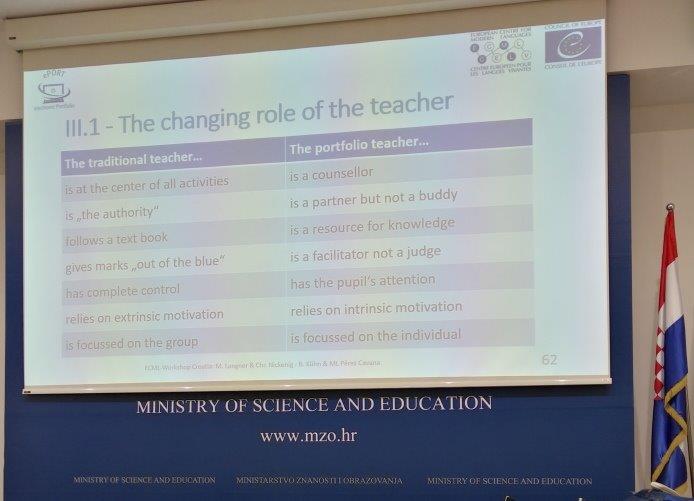
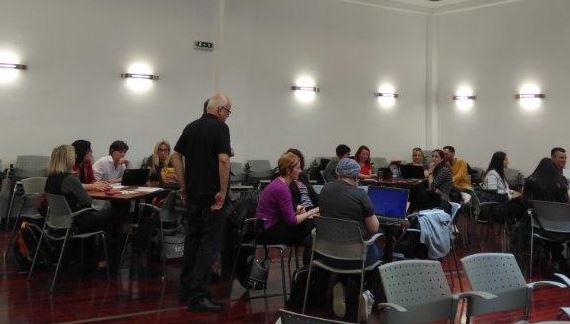

22.11.2016
Review of the workshop: "Plurilingual and intercultural competences: descriptors and teaching materials (FREPA / CARAP)" (Zagreb, Croatia, 12-13 September 2016)
Continuing the cooperation with the European Centre for Modern Languages (ECML) and the European Commission, together with the Croatian Ministry of Science, Education and Sports, an interesting workshop was held at Vladimir Prelog High School in Zagreb on 12-13 September 2016. The 17 participants, teachers of foreign languages (English, German, French and Italian) as well as representatives of the Ministry and the Education and Teacher Training Agency, were offered a series of lectures on plurilingual and intercultural competences. The moderators of the event, Anna Maria Curci and Michel Candelier, touched upon many topics important for plurilingualism and intercultural dimensions to be incorporated into the Croatian education system.
In today's world, especially in Europe, we are aware of the changes that we face every day, especially when it comes to many, relatively unknown cultures, that increasingly appear in our communities, and thus at our schools. A growing number of refugees and immigrants in our region make the need to understand different cultures and languages all the more important.
This two-day professional development workshop made it possible to have a closer look at the knowledge and skills that we have acquired and mastered in a (foreign) language in order to understand and speak additional languages. A list of descriptors (Knowledge, Attitudes and Skills) as well as sources are available on the website of http://carap.ecml.at where users can find useful online materials in accordance with the Common European Framework of Reference for Languages (CEFR).
In addition, discussions were held considering the new curriculum and CLIL, as well as the understanding of related languages. We discovered that, in fact, we understand many more languages than we think we do and that we have to remind our pupils / students that plurilingual understanding is actually much more present than we think. Our teaching should contribute to better awareness of this fact.
The local organiser: Ingrid Jurela-Jarak
*****
The training event held in Zagreb on 12 and 13 September 2016 brought together some 20 foreign language teachers, including a large majority of secondary school teachers and some teacher trainers. Most were English specialists.
Several participants had already heard of pluralistic approaches, and all of them had prior – more or less frequent – practice of connecting languages when learning. The training workshop allowed them to situate this practice within the framework of the construction of a plurilingual and pluricultural competence in accordance with the definitions of the Common European Framework of Reference (CEFR) and to link it to the overall aims of inclusion and democratic citizenship promoted by the Council of Europe. It provided them with a range of clear didactic objectives that helped them to better target their intervention, and it presented ways of using the database of didactic materials which is available on the website dedicated to the Framework of reference for pluralistic approaches of languages and cultures (CARAP/FREPA). It has motivated them to further engage with using pluralistic approaches in their teaching or teacher training. Several participants are considering setting up international partnerships to support them in this endeavour.
Possible obstacles to the implementation of pluralistic approaches were also addressed. In particular these relate to the need to attract school language teachers to use such approaches and to convince learners that the development of their skills in a foreign language requires developing a global plurilingual competence which involves their whole language repertoire.
The moderation team: Michel Candelier et Anna Maria Curci
19.07.2021
Relating language curricula, tests and examinations to the Common European Framework of Reference (RELANG): ECML online national training workshop (30 June – 2 July, Croatia)
Local organiser: Davor Černi, Education and Teacher Training Agency
ECML experts: Rita Juknevičienė, Lithuania; Gábor Szabó, Hungary
Participants: 20 (advisors, teachers, test creators, test evaluators)
“Following the implementation of the new foreign language curricula as a part of the curricular reform being carried out in Croatia, in the school year 2020/2021, mediation was introduced into 11th year classrooms of Croatian secondary schools. As it is a completely new grading element Croatian foreign language teachers have to deal with, it is considered to be essential to allow as many of the teachers to develop skills in this area as possible. Based on previous experience we had in cooperation with the ECML – EC RELANG project, Relating existing language examinations to the common European reference levels of language proficiency: promoting quality assurance in education and facilitating mobility was recognized as one of the resources that can be used to strengthen and improve the competences of Croatian language teachers. In the context of the above-mentioned, Module 1 Exploring ways to test mediation and pluricultural/plurilingual skills in the classroom was chosen as the most suitable tool to help us achieve given goals and outcomes. In a three-day workshop, the ECML consultants gave excellent guidance passing on both theoretical and practical knowledge to participants of this workshop, This will facilitate the use of the CEFR Companion Volume as a resource for an increased focus on mediation and on pluricultural/plurilingual skills, and to development of skills in order for them to satisfy assessment needs regarding competences and attitudes that help learners to develop skills to act as critical intercultural individuals and citizens.”
Davor Černi, local organiser, 13 July 2021
ECML project website: RELANG – EU-ECML cooperation agreement 2020-2021 "Innovative methodologies and assessment in language learning"
16.10.2019
EPOSTL workshop: examples of use in Austrian, Czech and Croatian universities - A tool for self-assessment and mentoring in language teacher education
Training workshop "European Portfolio for Student Teachers of Languages (EPOSTL)"
Date and venue: 2-3 October 2019, Primary school Franje Krežme, Osijek, Croatia
Local organiser: Snježana Šincek, Ministry of Science and Education
ECML expert team: Natalia Orlova (Czech Republic) and Barbara Mehlmauer-Larcher (Austria)
Participants: 23 teachers in elementary and secondary schools, teacher trainers, University professors and assistants
The European Portfolio for Student Teachers of Languages (EPOSTL) workshop was held in Osijek on 2 and 3 October 2019, in cooperation of the European Center for Modern Languages and the Ministry of Science and Education of the Republic of Croatia.
The two-day event was moderated by a EPOSTL expert team of the ECML – Barbara Mehlmauer-Larcher and Natalia Orlova, in cooperation with Sandra Mardešić from the Department of Italian Studies at the Faculty of Philosophy of the University of Zagreb who translated EPOSTL into Croatian in 2009 and since then has been using it with students at her Department, and Rea Lujić from the Department of French and Francophone Studies at the University of Zadar.
During the workshop participants were informed about the applicability of the EPOSTL possibilities in self-assessment, appliance of the EPOSTL at universities in Austria, Czech Republic and Croatia and how EPOSTL can be used to promote mentoring during practice phases at Croatian institutions of language teacher education.
Snježana Šincek, Ministry of Science and Education
Croatian version
Radionica Europski portfolio za obrazovanje nastavnika jezika (EPONAJ) je održana u Osijeku 2. i 3. listopada 2019. godine, u suradnji Europskog centra za moderne jezike i Ministarstva znanosti i obrazovanja Republike Hrvatske.
Dvodnevnu radionicu moderirao je tim ECML EPOSTL stručnjakinja - gđa Barbara Mehlmauer-Larcher, dr.sc., M.A. i gđa Natalia Orlova, u suradnji s dr. sc. Sandrom Mardešić s Odsjeka za talijanistiku Filozofskog fakulteta Sveučilišta u Zagrebu koja je 2009. godine prevela EPOSTL na hrvatski jezik i od tada ga koristi u radu sa studentima i dr. sc. Reom Lujić s Odjela za francuske i frankofonske studije Sveučilišta u Zadru.
Tijekom radionice polaznici su informirani o primjenjivosti EPOSTL-a/EPONAJ-a u samoprocjeni, njegovoj primjeni na sveučilištima u Austriji, Češkoj i Hrvatskoj i kako se EPOSTL/EPONAJ može koristiti za mentoriranje tijekom faza prakse na hrvatskim ustanovama za obrazovanja nastavnika jezika.
